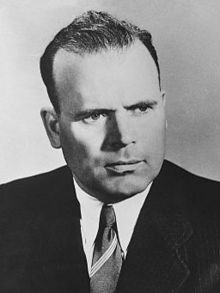Chivu Stoica
Chivu Stoica (born August 8, 1908 in Smeieni , Kingdom of Romania , † February 18, 1975 in Bucharest , Romania ) was a Romanian communist politician .
Stoica was Prime Minister of the People's Republic of Romania from 1955 to 1961 and then - as the successor to Gheorghe Gheorghiu-Dej - Chairman of the Council of State of the Socialist Republic of Romania from March 24, 1965 to December 9, 1967. His successor in the office of Head of State was Nicolae Ceaușescu , who was already In 1965, after Gheorghiu-Dej's death, he became general secretary of the Romanian Communist Party .
Early work
After Chivu Stoica had completed his apprenticeship with a railway company, he first worked in a metallurgical factory. In 1929 he joined the illegal communist youth organization. In the early 1930s he worked as a boilermaker in the Grivița works . In June 1934 an appeal process took place in Craiova , in which a communist group that had formed around Gheorghe Gheorghiu-Dej had to answer for rebellion, strike baiting and the associated riots in January / February 1933. The then 25-year-old Chivu Stoica was, along with Gheorghe Vasilichi and Dumitru Petrescu, also part of the illegal group that regularly called for strikes in the railway industry. Because of his involvement in the Grivița rebellion, Stoica was ultimately sentenced to twelve years' imprisonment, which he initially spent in Aiud prison. However, on May 15, 1937, the prisoner suffering from syphilis was transferred to Doftana prison. Stoica spent other parts of his sentence in the prison of Caransebeş and the maximum security prison of Târgu Jiu .
In post-war Romania
The communist movement in Romania lost its illegal status with the invasion of the Red Army and the turn of the war. With the support of the Soviet Union, the Romanian Communist Party (RKP) eventually came to power. In 1948 Gheorghe Gheorghiu-Dej became general secretary and both Gheorghe Apostol and Stoica took care of the unions from then on. In the course of de-Stalinization , Nikita Khrushchev called for the offices of prime minister and party leader to be separated. For this reason, Dej Stoica left the post of prime minister in October 1955 in order to take over the much more influential party chairmanship himself. After Dej's death in 1965, it was unclear who would succeed him. In addition to Nicolae Ceaușescu, Gheorghe Apostol and Alexandru Drăghici , Stoica was also a potential candidate . However, Ceaușescu promised Stoica to chair the State Council - provided that the latter renounced the party chairmanship. Stoica agreed. In any case, he was unable to fill the office in full: in the years that followed, he became increasingly confused. When Ceaușescu gave up the concept of collective leadership in 1967, he took over the position of chairman of the State Council on December 9, in addition to the party chairmanship. He then appointed Stoica "President of the central party college".
death
Chivu Stoica died on February 18, 1975. He is said to have shot himself with a rifle. However, this claim has not yet been proven. Ion Gheorghe Maurer explained after the fall of Ceaușescu: "We were told that he had killed himself [...] Motives were not mentioned [...] It may well be that his death was arranged. There was no investigation . " Stoica's wife, Maria Manolescu-Stoica, also doubted her husband's alleged suicide.
literature
- Chivu Stoica , in: Internationales Biographisches Archiv 32/1975 of July 28, 1975, in the Munzinger Archive ( beginning of article freely available)
Individual evidence
- ↑ Chivu Stoica in the Munzinger archive , accessed on June 15, 2019
- ↑ munzinger.de Biography of Chivu Stoica on munzinger.de
- ↑ Kunze, Thomas: Nicolae Ceaușescu: Eine Biographie, Berlin 2009, p. 29f.
- ↑ Kunze, Thomas: Nicolae Ceaușescu: Eine Biographie, Berlin 2009, p. 36ff.
- ↑ Burmester, Siegfried: From Communism to Communism: Another Human History, Berlin 2009, p. 178.
- ↑ Kunze, Thomas: Nicolae Ceaușescu: Eine Biographie, Berlin 2009, p. 150f.
- ↑ Kunze, Thomas: Nicolae Ceaușescu: Eine Biographie, Berlin 2009, p. 163.
- ^ Pacepa, Ion Mihai: Red Horions: The true story of Nicolae and Elena Ceaușescus' Crimes, Lifestyle and Corruption, p. 130
- ↑ Kunze, Thomas: Nicolae Ceaușescu: Eine Biographie, Berlin 2009, p. 163f.
| personal data | |
|---|---|
| SURNAME | Stoica, Chivu |
| BRIEF DESCRIPTION | Romanian communist politician |
| DATE OF BIRTH | August 8, 1908 |
| PLACE OF BIRTH | Smeieni , Kingdom of Romania |
| DATE OF DEATH | 18th February 1975 |
| Place of death | Bucharest , Romania |
